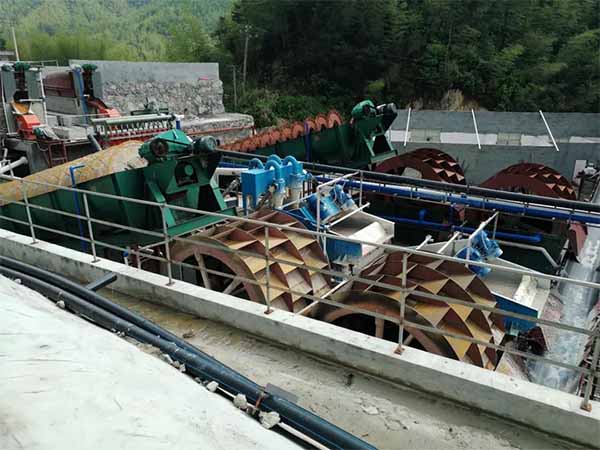Beneficiation Processing And Required Equipment of Silica Sand
The commonly used beneficiation and purification processes of silica sand mainly include the ore washing and desliming method, magnetic separation method, flotation method, and pickling method, which are designed to remove impurity minerals contained in the original ore. The main component of quartz sand is silica, accompanied by small or trace impurities. Silica sand has a wide range of applications and a large demand, so it is necessary to purify the ore to obtain high-purity quartz sand.
1. Washing and desliming method
The commonly used silica sand washing and desliming method is mainly the scrubbing method, which is usually completed by the high-efficiency scrubbing machine. In the production process, a rubbing aid can be added to change the particle size composition of minerals, enhance the fragmentation of mineral particles by the scrubbing machine, and improve the impurity removal efficiency of quartz sand. Keep the scrub concentration between 50% and 60%. The scrubbing time is determined according to the nature of the ore, based on the initial product quality requirements.
Application
The scrubbing method is suitable for quartz sand containing a large amount of clay and sludge, or for removing thin-film iron and adhesion impurities on the surface of quartz sand.
Required equipment
High-efficiency scrubbing machine, hydrocyclone separator, hydraulic classifier, desliming bucket
2. Magnetic separation
The magnetic separation method is based on the magnetic difference between the quartz sand and the associated impurity minerals. For strong magnetic minerals, weak magnetic separation can be used for separation. For weakly magnetic minerals, strong magnetic separation is required. It should be noted that when using magnetic separation to purify quartz ore, the number of magnetic separations and the intensity of the magnetic field should be effectively controlled. It is not that the higher the magnetic field strength and the more times of magnetic separation, the better the magnetic separation effect. Under normal circumstances, as the number of magnetic separations increases, the iron content in the ore will decrease, but only under a certain magnetic field strength can most of the iron be removed. The iron removal effect is also related to the grain size of the quartz sand. Generally, the smaller the grain size of the quartz sand, the better the iron removal effect.
Application
Magnetic separation is often used to remove the weakly magnetic impurities mainly containing hematite and limonite contained in the quartz sand particles and the strong magnetic minerals mainly containing magnetite.
Required equipment
Drum type magnetic separator, high-strength magnetic separator
3. Flotation method
The flotation method can be used for purification, such as removing mica and feldspar from quartz ore, when scrubbing, ore washing, desliming, and magnetic separation cannot achieve the purification effect.
Remove mica: pH value 3-4, the cationic collector is used for flotation separation.
Remove feldspar: In acidic conditions, fluorine-free flotation and fluorine-free flotation are used according to the different reagents used.
Application
Mainly used to remove feldspar, mica and various non-magnetic accompanying impurities in quartz sand.
Required equipment
Stirred flotation machine
4. Pickling method
Silica sand is insoluble in acid (except HF), and acid solution can dissolve other impurity minerals. The pickling method uses this feature to realize the beneficiation and purification of quartz. Acids commonly used in the quartz sand pickling method include sulfuric acid, hydrochloric acid, nitric acid, and hydrofluoric acid. According to production practice, the mixed-use of acid has a better effect on the beneficiation and purification of quartz sand.
Application
Quartz sand contains iron, aluminum, magnesium, titanium, chromium, and other impurities, and the purity of quartz sand is relatively high.
Required equipment
Double impeller mixing tank
Related Products
There are no relevant articles.



